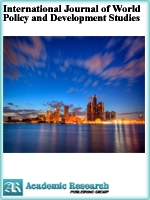International Journal of World Policy and Development Studies
Online ISSN: 2415-2331
Print ISSN: 2415-5241
Print ISSN: 2415-5241
Quarterly Published (4 Issues Per Year)

Archives
Volume 6 Number 5 May 2020
Socioeconomic Impact of COVID-19 in Oil Exporting Countries: An Analytical Review of the Macroeconomic Indicators in Nigeria
Authors: Miftahu Idris ; Oruonye E. D.
Pages: 44-50
DOI: doi.org/10.32861/ijwpds.65.44.50
Abstract
One of the most burning issues that have dominated the public sphere in Nigeria and other oil exporting countries is the covid-19 pandemic and its attendant challenges. This pandemic is a shock on real economic fundamentals and frictionless of the market. It introduces a barrier between the market forces with strong complementary feedbacks in the real economy. The absence of precise vaccine or medication for the virus has necessitated the adoption of several precautionary measures with the aim of containing its wide spread. Critical among which are the travel restrictions, lockdown measures as well as social and physical distancing. These measures have detrimental effect on the demand and price of oil in the international market. In view of that, this study evaluates the social and economic impact of covid-19 in Nigeria taking into cognisance the effect on certain critical macroeconomic indicators. The study adopted an analytical approach to supplement the much ongoing documentations on the subject matter. Result shows that virtually all essential macroeconomic indicators are grossly affected with tax, remittances and employment exhibiting severe consequences. Also, uncertainty, panics and lockdown measures are key to motivating higher decrease in world demand. The supply disruptions and huge death toll generates a heightened uncertainty and panic for household and business. This uncertainty and panic leads to drop in consumption and investment thereby causing a decrease in corporate cash flows and triggered firm’s bankruptcy. Also, lay-off and exiting firms produce higher unemployment while labour income decreased significantly. Since it entails a large amount of government expenditure especially in the health sector which is required to contain the spread of the virus, there is needs for government to diversify its revenue sources and thus drop over dependency on the oil remittance. Furthermore, there is a need to support the financial system to avoid the health crisis becoming a financial crisis in the long-run.



